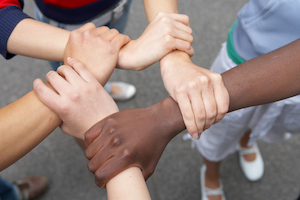Can Gratitude Make Our Society More Trusting?
According to a new study, a week of gratitude journaling can help to make us more trusting of people we don't know.
Research suggests that Americans have become less trusting over the past few decades. That’s a problem: Trust has numerous benefits for individuals and societies, such as healthier relationships, lower crime, and even a better economy. So how can we reverse this trend?
A new study suggests one potential way: by increasing feelings of gratitude. In the study, published recently in the journal Personality and Individual Differences, researchers found that people who had consciously counted their blessings for just a week were more likely to trust others.

The researchers asked half of the participants to complete a gratitude journal: Every three days, they listed up to five things for which they felt grateful; the other half of the participants simply wrote about what they had done over the past several days. Everyone completed a total of three journal entries, over the course of approximately one week.
Several days after completing their journals, the study participants played a short online “trust game” in the research lab. They were told that they would be exchanging money with another participant (although, in actuality, the game was played with a computer and there was no other participant). Participants were given a small amount of money and could choose to give some of this money to that other (fictional) participant. They were told that any money they gave away would be tripled (e.g., if a participant gave away $1, the other participant would receive $3), and the second player could choose whether to send any of this windfall back.
Participants who were more trusting of others would presumably give more money to the second person: They would expect that they would get their money back and that both participants would profit. However, less trusting participants would presumably avoid any risk by keeping the original money for themselves.
The researchers found that, compared with the participants who had simply written about their days, participants who had completed the gratitude journaling were more trusting. The former group sent about half of their money (on average) to their partner in the game, while the gratitude group sent almost 70 percent of their money. Participants in the gratitude group also reported feeling more grateful to their partner for sending money back to them.
“Raising our ability to appreciate how other people are beneficial in our lives has a downstream consequence of changing the way we relate to strangers,” says Todd Kashdan, professor of psychology at George Mason University and a coauthor of the study.
In addition to measuring how much money participants gave to their partner, the researchers measured participants’ blood pressure and breathing rate during the interaction to see if there were any physical effects. They found that participants who had written about gratitude had higher systolic blood pressure, both while they were deciding how much money to send and when they were waiting to learn how much money their partner had returned to them. Participants in the gratitude group also had faster breathing while waiting for the money to be returned to them and immediately after the money was returned.
You might think that higher blood pressure and faster breathing are signs of stress. But according to the researchers, they could instead indicate that participants in the gratitude group felt more engaged in the task, or perhaps more enthusiastic about the task, because they expected their generosity to be repaid.
Why did the gratitude group feel more trusting towards others? The researchers hypothesized that this could be due to positive emotions: Participants who had completed the gratitude journal would be expected to feel more positive emotion, and their positive emotions would cause them to be more trusting. The researchers indeed found support for this: Participants who had completed the gratitude journal reported higher levels of positive emotions during the trust game, and these feelings accounted for their decision to trust their partner with more money.
This new study builds on prior research showing that gratitude can make us more willing to behave in kind and helpful ways. In one study, for example, participants who felt grateful to someone for helping them were subsequently willing to spend more time helping someone else. Another study showed that a gratitude writing activity increased people’s willingness to trust others immediately afterward. This latest study suggests that the effects of gratitude on trust persist even longer, after the activity has ended.
According to Kashdan, this research highlights the powerful effects that gratitude activities can have. “It seems unfathomable that such small interventions could have such broad effects,” he says, but past research bears out the wide-ranging benefits of gratitude.
His advice? “Seriously consider including gratitude interventions in your life.” Even brief and simple gratitude practices may be able to help increase trust in society, at a time when it’s sorely needed.